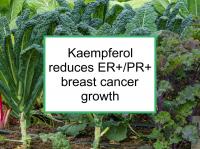A new study has reported that, in addition to inhibiting the growth of hormone receptor positive (ER+/PR+) breast cancer cells, the flavonol kaempferol may protect against the cancer-promoting effects of triclosan. Triclosan is an antimicrobial endocrine disruptor to which most people are routinely exposed.
Triclosan is found in household and personal care products
Triclosan (5-chloro-2-(2,4-dichlorophenoxy)phenol) is an antimicrobial agent used in personal care, pharmaceutical, industrial, and household products. Exposure would be difficult for most people to avoid since it is widely used in detergents, soaps, toothpaste, and hair care products. Triclosan is an endocrine disruptor (a chemical that interferes with hormone systems in the body) which has been shown to have estrogenic activity in the uterus of immature rats. Triclosan has also been shown to promote ER+/PR+ breast cancer cell growth in the laboratory, although firm links to breast cancer risk or progression have not been established.
Latest research finds kaempferol may help counteract triclosan
The study referenced at the beginning of this news article was designed to investigate kaempferol's anti-cancer activities, including its effects on triclosan-induced growth of ER+/PR+ MCF-7 breast cancer cells. The authors first demonstrated that kaempferol significantly reduced the viability of MCF-7 breast cancer cells. In addition, kaempferol was shown to reverse triclosan-induced breast cancer cell growth.
To confirm and elucidate kaempferol's actions against triclosan-induced cell growth, the authors then examined the levels of cell growth and cell death-related markers, namely, cyclin D, p21, cyclin E, p27 and bcl-2, and bax genes. Triclosan increased the expression levels of cyclin D and cyclin E, as well as the bax/bcl-2 ratio, while reducing p21 and p27 mRNAs in MCF-7 cells. Kaempferol reversed the altered gene expressions and other effects of triclosan. The authors conclude that kaempferol may inhibit the growth MCF-7 cells by regulating cell cycle and apoptosis-related genes. In addition, kaempferol may inhibit endocrine-disrupting chemical-induced progression of ER+ breast cancer.
